If you raise goats, at some point or another, you will find that one or more of your goats is unable to stand.
This can be a scary experience and sometimes dangerous if not addressed as soon as possible.
It is vital to learn the important things that you can do when your goat will not stand.
Goats that are not able to stand for a long time can suffer fatal consequences, so it is imperative that you try to do whatever you can quickly.
The quicker you act, the quicker you can get your goat the help it needs.
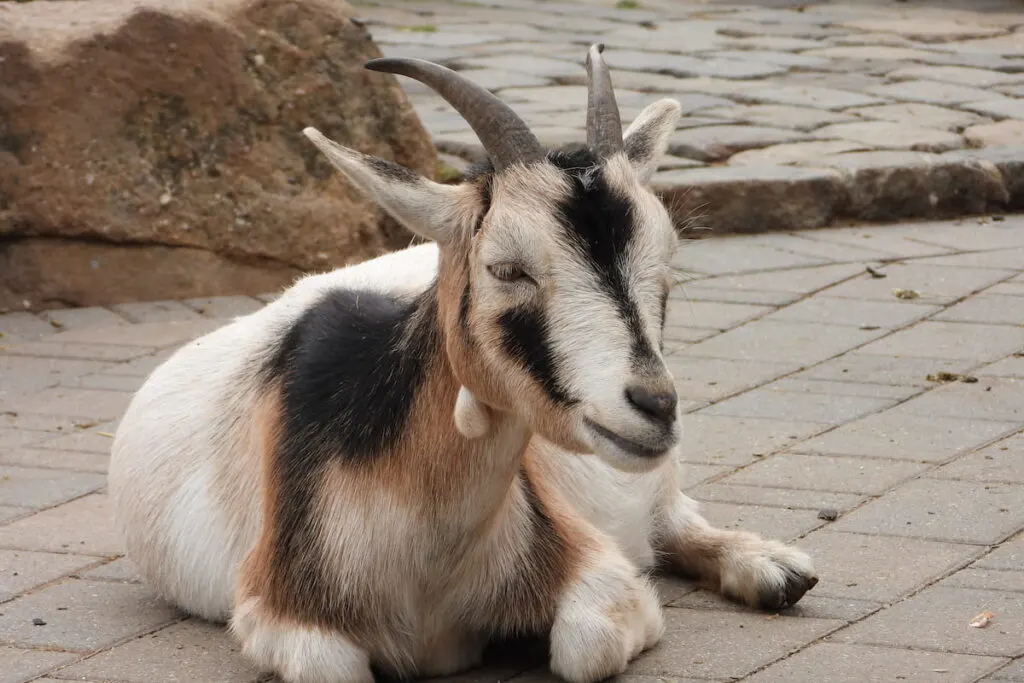
What to Do When Your Goat Won’t Stand
A goat that is unable to stand when prompted can be indicative of a bigger issue.
Here are some of the most important things that you should do when you goat will not stand.
Call a Vet
It is imperative that you call a veterinarian when you have a goat that will not stand at all.
If there is a severe injury that is visible, get professional help as soon as possible.
Look for Anything Restraining the Goat
Check the goat’s body and the immediately surrounding space to see if they are being pinned down by something.
It may have gotten tangled in a string, wire, fence, or other material that is causing it to be unable to stand up.
It is also possible that the goat has struggled so much to get free that it is so exhausted that it cannot stand.
Check for Visible Injuries
Sometimes a goat will not stand because they have a cut or wound of some kind that is causing pain or preventing them from standing.
Look for bleeding or a bone deformity that could indicate a broken bone or dislocation.
Be sure to check both sides of the goat’s body and all extremities.
Help the Goat Move and Stand
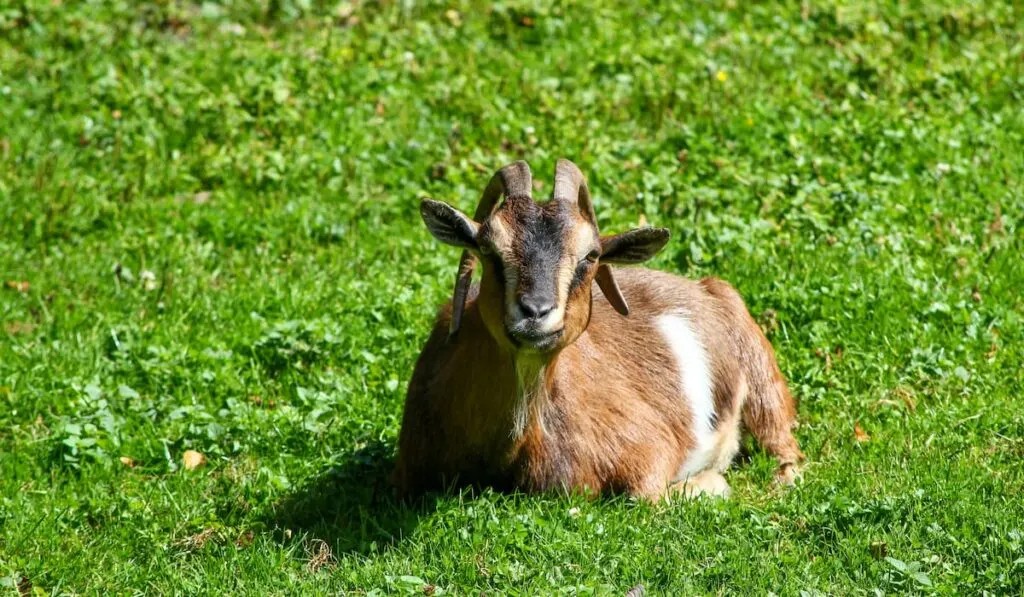
Sometimes, a goat may just need a little help standing up.
It may have gotten stuck in a odd position and now it has been laying down so long it cannot stand.
This is not typically the case, but it is worth a try.
If the goat continues to stand and even walk, check for gait issues or a source of possible pain.
If the goat is unable to stand, even with assistance, continue to help the goat move positions while it is laying down.
The goat should not sit in the same exact position or lay on the same side continuously for more than a few hours at a time.
It is also important that the goat is able to sit up to eat and drink if possible but it may need the help of a brace or wall of some kind behind it to help.
Check the Goat’s Temperature
Using a rectal thermometer, check the goat’s temperature to see if it has a fever.
Anything over 103 degrees could mean that the goat’s body is fighting an infection of some kind.
If it is abnormally low, under 100 degrees, that could mean that it’s body is shutting down and if so, vet care is needed immediately if you want to save the goat.
Check for Anemia
To check a goat for anemia, pull down on one of its bottom eyelids and visually inspect the pink area.
It should be somewhere between a vibrant pink shade to a bright red color. This means it is not anemic. If it light or pale pink in color, that is an indication of anemia.
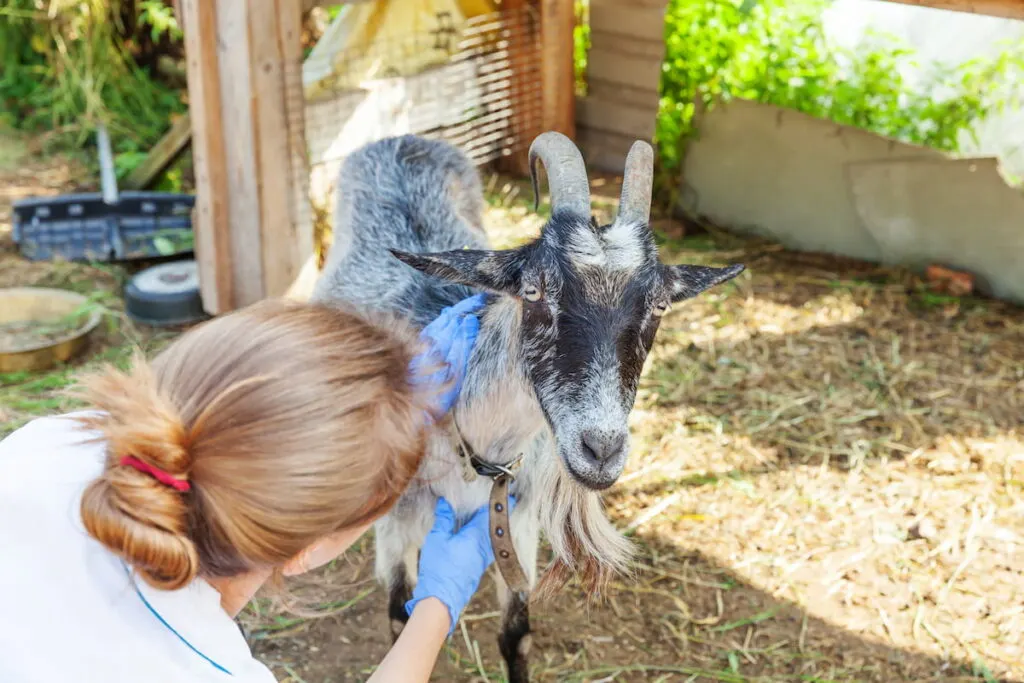
Anemia in goats can be caused be a variety of parasites including worms, ticks, and fleas.
Anemic goats require immediate treatment by a veterinarian or an experienced goat owner because it can be fatal if ignored.
Rule Out Dehydration
Dehydrated goats can get so weak that they are unable to stand up.
Goats, like all animals, require water to keep their bodies functioning properly. Dehydrated goats will have abnormally dry noses, dry eyes, constipation, and show signs of lethargy.
Examine Hooves for Issues
Physically examine the goat’s hooves. Check for puncture wounds or foreign objects that may be causing pain.
Examine the area right above each hoof and feel for warmth or swelling. Each of these symptoms could be indicative of an abscess.
Next, make sure that the hooves are not overgrown or disfigured in some way that could lead to lameness.
While not all goats need their hooves trimmed regularly, some do. The bottom of a healthy goat’s hooves should be flat, matching the angle of the hairline that sits on top of the hoof.
Move the Goat to a Safe Location
Goats that are unable to stand should be moved to a safe location, out of the elements.
The goat needs to be sheltered out of the sun and in a warm area if it is cold outside.
Moving the goat to a safe location is also imperative to keep the wolves, coyotes, and other goats from hurting it.
Provide Water and Hay
Place water and hay close enough to the goat that it can reach them without having to stand.
The goat should be able to reach water and hay without having to move anything but its head and neck. This will help keep it hydrated and keep its digestive tract moving while it is unable to stand up.
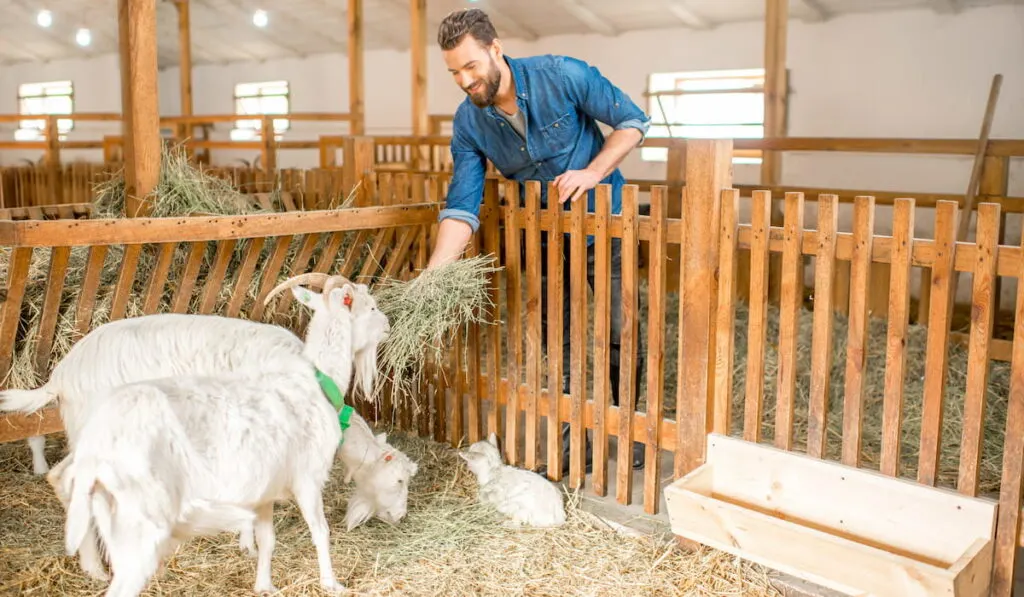
Avoid Feeding Grain
Grain should not be fed to a goat that is unable to stand.
While it may seem counterproductive to not feed grain, the truth is that it can cause irreversible damage.
Grain moves more slowly through a goat’s digestive tract and even more so in a goat that is unable to stand or defecate easily.
The grain will sit too long in the goat’s digestive system causing bloat, a potentially fatal issue in ruminant livestock like goats.
Illnesses That Can Cause a Goat to Not Want to Stand
There are some illnesses that can cause a goat to not want or not be physically able to stand.
These illnesses are often accompanied by other symptoms that may help you narrow down the possible culprit or rule them out.
Listeriosis
Listeriosis is caused by the listeria bacteria that is sometimes present in the pastures where goats graze.
It can lead to a variety of unpleasant and dangerous symptoms including lethargy, stargazing, stumbling, dehydration, a stiff neck, and severe lack of energy.
Polio
Polio encephalomalacia, also known as polio, is a disease that causes symptoms similar to that of listeriosis.
A tell-tale sign of polio in goats is called “stargazing”, when a goat’s eyes and head look up towards the sky.
Staggering, diarrhea, dehydration, and blindness are all symptoms of polio. When the goat gets too weak from symptoms, it may no longer be able to stand.
Meningeal Worm
Also referred to as the deer worm, the meningeal worm can be detrimental to goats.
Symptoms include depression, seizure, weight loss, and paralysis. The inability to stand could be a sign of meningeal worm infestation.
Founder
Laminitis means that the laminae in the hooves breaks down due to inflammation often caused by overfeeding.
This eventually leads to founder which causes the goat difficulties when walking or trying to stand up.
Foundered goats may try to walk on their knees and their hooves will look inflamed, disfigured, and have overgrowth.
Caprine Arthritis Encephalitis
Caprine arthritis encephalitis, also known as CAE, is a dangerous viral illness that goats can contract.
Arthritic CAE can lead to swollen joints, weight loss, and difficulties when standing or trying to walk.
Encephalitic CAE can lead to paralysis that will make it impossible for a goat to stand up.
How Long Do Healthy Goats Usually Lie Down For?
Goats normally lie down for several hours throughout the day to sleep or rest.
If you notice that your goat has not moved for a long time and is not with the rest of the herd, you should check on it.
When prompted, a healthy goat that is just resting will be able to stand up quickly with ease.
A goat that is having an issued standing up may try to get up unsuccessfully or may not even try to move when prompted.
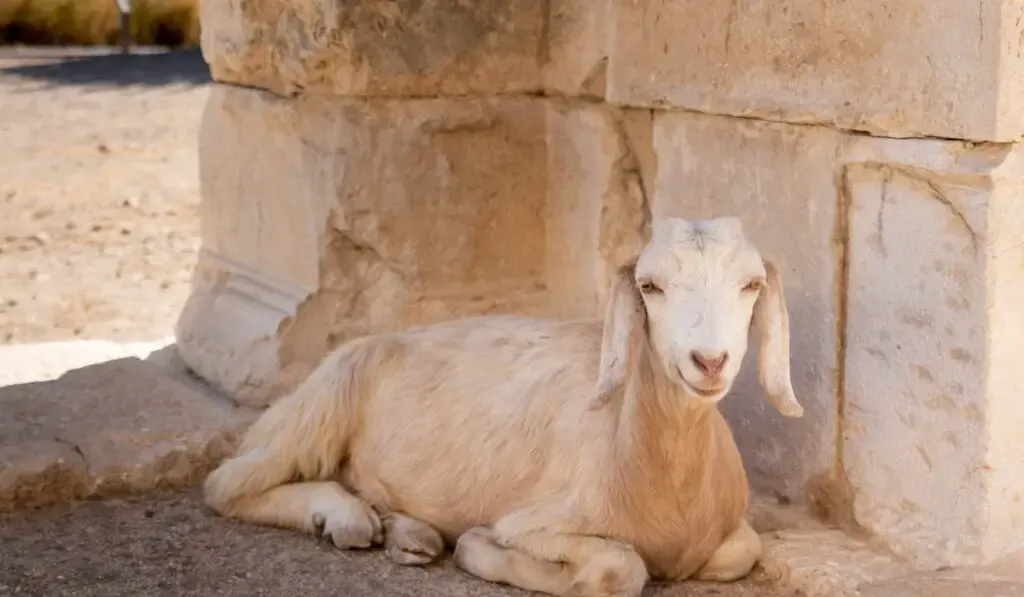
Three Reasons a Healthy Goat Might Not Want to Stand
Occasionally, healthy goats may refuse to stand but there is a benign reason. Here are a few of the reasons an otherwise healthy goat will not stand.
- It is Heavily Pregnant or in Labor – If the goat in question is very pregnant and reaching the end of its pregnancy, it will lay down to rest while in labor or while actively giving birth.
- It is Exhausted – Goats that have been grazing all day, especially in the heat, or playing with other goats, may simply be tired.
A tired or lazy goat may refuse to stand for an extended period of time simply because it wants to rest or sleep. - It is Stubborn – Some goats are just stubborn and refuse to stand up. They may find a comfortable spot and not want to lose it, so they may not stand when the other goats do.
Try nudging the goat and pushing it to stand if you want to make sure it is fine.
Final Thoughts
Goats normally lie down throughout the day to sleep and rest.
If the goat is acting normal and can easily stand, all is well.
When the goat is unable to stand, you know now what to do and what to look for.
Remember, a vet’s advice and care is often essential for goats that are unable to stand and showing other signs of distress.
Resources:
It is important to know what to do when your goat will not stand. Here are the resources used to craft this helpful article.
- https://tennesseemeatgoats.com/articles2/anemiaingoats.html
- http://www.tennesseemeatgoats.com/articles2/listeriosis.html
- http://goatconnection.com/articles/publish/article_126.shtml
- https://www.tennesseemeatgoats.com/articles2/pneumonia06.html
- https://goats.extension.org/caprine-arthritis-encephalitis-virus-cae/
- https://www.mayoclinic.org/diseases-conditions/anemia/symptoms-causes/syc-20351360
